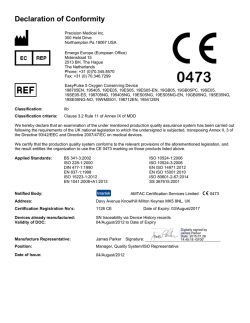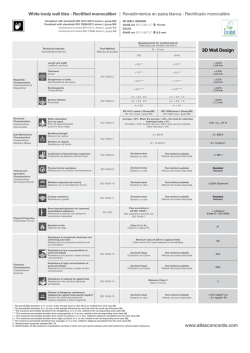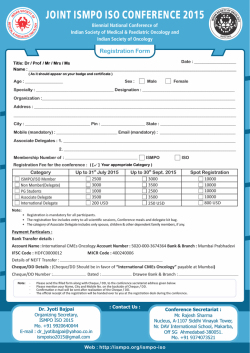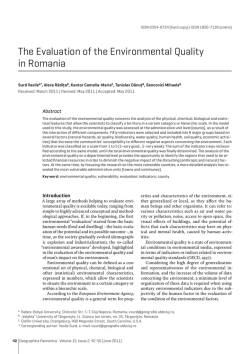
Data for Cities: Driving Informed Investment in Infrastructure World
Data for Cities: Driving Informed Investment in Infrastructure World Council on City Data and ISO 37120 ReNew Canada Magazine March/April 2015 Issue By: World Council on City Data The pressure on city leaders and managers to make smart decisions regarding infrastructure planning and investment has never been greater. A recent report from McKinsey estimates that the world will require $57 trillion in infrastructure investment to 2030 – more than the current value of the worlds’ existing infrastructure stock – with the majority of investment needed in urban centres. This is a global issue: advanced economies need to maintain and replace aging infrastructure, while fastgrowing cities in the developing world need major investments just to provide basic levels of services and keep pace with service demand by rapidly growing populations. This is coming at a time where financing capital investments can be very difficult for city administrations, particularly given constraints on public budgets across all levels of government. Infrastructure investment is also taking place in an increasingly complex planning environment, as cities are also seeking to drive sustainability and improve resilience to climate change and natural disasters. Achieving ambitious sustainability and resilience targets will often necessitate major transformations in the design, construction and operation of a city’s infrastructure systems – including buildings, energy, mobility, telecommunications, water, wastewater, sanitation and waste management services – and optimizing the inter-linkages between these systems. Cities – where both people and infrastructure are concentrated – are also likely to bear a major share of the burden of the costs and risks associated with climate change, as well as the responsibility of greatly improving system resilience. Not surprisingly these complex challenges are driving demand for globally comparable data, strategic analytics, and a more comprehensive knowledge of city performance to inform decision making. In fact, comparable data and city indicators are now increasingly seen as critical for making cities more liveable, inclusive, sustainable, resilient and prosperous. ISO 37120 - Indicators for City Services and Quality of Life This is what makes the publication of a new international standard on city indicators such an exciting development. ISO 37120 Sustainable Development of Communities -- Indicators for City Services and Quality of Life, was published in May 2014 by the International Organization for Standardization (ISO). Now hosted by the World Council on City Data (WCCD), ISO 31720 defines and establishes methodologies for a comprehensive set of indicators that will enable any sized city in a developed or developing economy to track and measure its social, economic, and environmental performance in relation to other cities. This first ISO international standard on city metrics has been developed by the Global City Indicators Facility (GCIF) at the University of Toronto in partnership with the Government of Ontario and is based on a set of indicators and their corresponding definitions and methodologies that was developed and tested by the GCIF and the member cities (over 255 cities worldwide). ISO 37120 was also developed using input from the ISO Technical Committee on Sustainable Development of Communities (ISO/TC 268). Members of TC268 included international organizations, leading businesses, and international experts from over 20 countries including Canada. Canada is leading the efforts on standardized indicators for cities and currently convenes the working group on city indicators within TC268. ISO 37120 includes 100 indicators, which are structured around 17 themes that define city services and aspects of quality of life in cities. These include: education, transportation, safety, governance, water and sanitation, solid waste and recreation. Recognizing the differences in resources and capabilities between developed and developing world cities, the overall set of city indicators has been divided into “core” indicators, which all cities adhering to the standard would be required to report on and “supporting” indicators. Cities must report on the 46 core indicators for conformity to ISO 37120. ISO 37120 represents a critical paradigm shift when it comes to city data. It provides cities and stakeholders with an opportunity for a standardized approach to city metrics, and a global framework for third party verification of city data. A reliable foundation of globally standardized data will assist cities in building core knowledge for city decision-making, and enable comparative insight and global benchmarking. ISO 37120 is part of a new series of International Standards being developed for a holistic and integrated approach to sustainable development and resilience. In addition to ISO 37120, a new series of standards on resilience indicators for cities is now being developed. A precursor Technical Report ISO 37121 Sustainable Development in Communities — Inventory and review of existing indicators on sustainable development and resilience in cities is being drafted under TC268 with leadership by the University of Toronto team, to help inform the framework for the development of these new indicators. The indicators will provide a basis for assessing the core components of urban resilience such as the robustness and flexibility of the infrastructure systems on which cities critically depend. Benefits to Municipalities Standardized indicators enable cities to assess their performance and measure progress over time and also to draw comparative lessons from other cities locally and globally. They also help to guide policy, planning and management across multiple sectors and stakeholders. City leaders worldwide want to know how their cities are doing relative to their peers. Standardized indicators allow city leaders to measure their performance and compare with their peers to foster learning and the sharing of best practices. The new international standard ISO 37120 will be particularly useful in helping cities investing in making their infrastructure more sustainable and resilient. It will foster more informed decision-making, enable local benchmarking and planning, facilitating learning across cities, and help cities to leverage funding and recognition from international entities and senior levels of government. Cities are now working with the WCCD to also review potential applications of cities adopting the Standard for other management tools, including credit/bond ratings, risk assessment for insurance, and other applications. Looking forward The World Council on City Data (WCCD), launched in May 2014 at the Global Cities Summit in Toronto, has been established to take this critical data agenda forward. The WCCD coordinates all efforts on city data to ensure a consistent and comprehensive platform for standardized urban metrics through ISO37120 and future standards under development. The organization is a global hub for creative partnerships that enable learning across cities, international organizations, corporate partners, and academia, to further innovation, envision alternative futures, and build better and more livable cities. In 2014, the WCCD worked with 20 Foundation Cities to pilot the implementation of ISO 37120. In November 2014 the following cities became the first in the world to be certified in accordance with ISO 37120: Amman, Amsterdam, Barcelona, Bogota, Boston, Buenos Aires, Dubai, Guadalajara, Haiphong, Helsinki, Johannesburg, London, Makati, Makkah, Melbourne, Minna, Rotterdam, Shanghai, and Toronto. This achievement was recognized at a high-level meeting of city leaders held in London (UK) City Hall on November 17-18, 2014. With this pilot complete, the WCCD has opened the process to all cities globally to adopt ISO 37120. There are now over 100 more cities signing expressions of interest and filing applications with the goal of adopting ISO 37120 in the early months of 2015. The WCCD particularly encourages Canadian cities and municipalities to become a member of this “Made in Canada” global initiative. For more information on ISO 37120 and the WCCD please visit www.dataforcities.org.
© Copyright 2026







